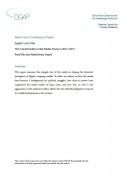Media contributes to the process of writing history. It provides the public with constant updates, building up their view of what is happening. This is often regarded as the objective “truth.” But “truth,” as Michel Foucault noted, does not exist independent of power. Truth is a social product and therefore relative. Much like knowledge, it is bound to power and operates among the individuals and institutions that generate and sustain it. In countries undergoing political transformation, like Egypt, the media take up the role not only of informing the public on those changes but also of shaping public opinion, the narrative(s) around the present, and the very course of history.
This paper examines the media’s integral role in Egypt’s ongoing conflict. It offers an analysis of how the media have become a battleground for political conflicts, how the authorities have suppressed the media outlets of their rivals, and how this, as well as the aggravation of the political conflict, affects the way individuals see the conflict and overall developments in the country.

